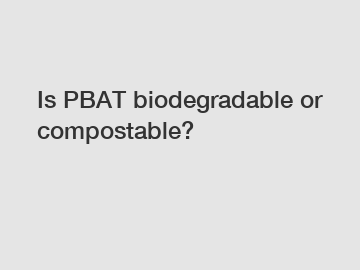Is PBAT biodegradable or compostable?
Is PBAT biodegradable or compostable?
Biodegradable and compostable materials have gained significant attention in recent years due to the growing concern over the environment and the need for sustainable alternatives. One such material is PBAT, a biodegradable polymer often used in packaging and disposable products. But is PBAT truly biodegradable or compostable? Let's dive into this question and explore the facts surrounding PBAT's environmental impact.
1. Understanding PBAT:

PBAT, or Polybutylene Adipate Terephthalate, is a type of biodegradable polymer derived from fossil fuels. It belongs to the family of aliphatic polyesters and is commonly used as a blend with other polymers to enhance their biodegradability. PBAT is widely utilized in various applications, including packaging films, bags, agricultural mulch films, and disposable cutlery.
2. Biodegradability of PBAT:
PBAT is indeed biodegradable, meaning it can break down into natural compounds under specific conditions. However, the rate at which it biodegrades varies greatly depending on the environment, such as temperature, humidity, and the presence of microorganisms. In industrial composting facilities, which provide ideal conditions for microbial decomposition, PBAT can typically decompose within a few months.
3. Compostability of PBAT:
Compostability refers to a material's ability to undergo biological decomposition in a composting environment, leaving no toxic residue. While PBAT is biodegradable, not all PBAT products are necessarily compostable. The compostability of PBAT depends on additional factors, such as the presence of other materials in the product or its thickness.
4. Certification standards:
To establish the compostability of PBAT products, several certification standards have been developed. The most widely recognized standard is the European standard EN 13432, which sets specific criteria for a product to be considered compostable. To meet this standard, PBAT products must break down into harmless substances and produce no more than 10% residue after three months in an industrial composting facility.
5. Home composting:
While PBAT may biodegrade in industrial composting facilities, its behavior in home composting is still under investigation. The conditions in home compost piles may not be as controlled as in industrial facilities, potentially affecting the rate of PBAT degradation. Therefore, it is generally recommended to dispose of PBAT products in industrial composting or waste disposal facilities.
6. Sustainable alternative:
PBAT offers a more environmentally friendly alternative to traditional plastics, which can persist in the environment for hundreds of years. By choosing PBAT-based products, individuals and businesses can contribute to reducing plastic waste and carbon footprint. However, it is crucial to ensure proper disposal of PBAT items to maximize their environmental benefits.
In conclusion, PBAT is biodegradable, but whether it is compostable depends on various factors. PBAT products that meet specific standards can be considered compostable under industrial composting conditions. However, their behavior in home composting is still being studied. PBAT serves as a sustainable alternative to conventional plastics, but responsible disposal is crucial for maximum environmental impact. As the demand for eco-friendly materials grows, further research and development in the field of biodegradable and compostable polymers, including PBAT, will continue to improve its environmental performance.
Are you interested in learning more about biodegradable resin, biodegradable resin, biodegradable starch resin? Contact us today to secure an expert consultation!

Comments
0